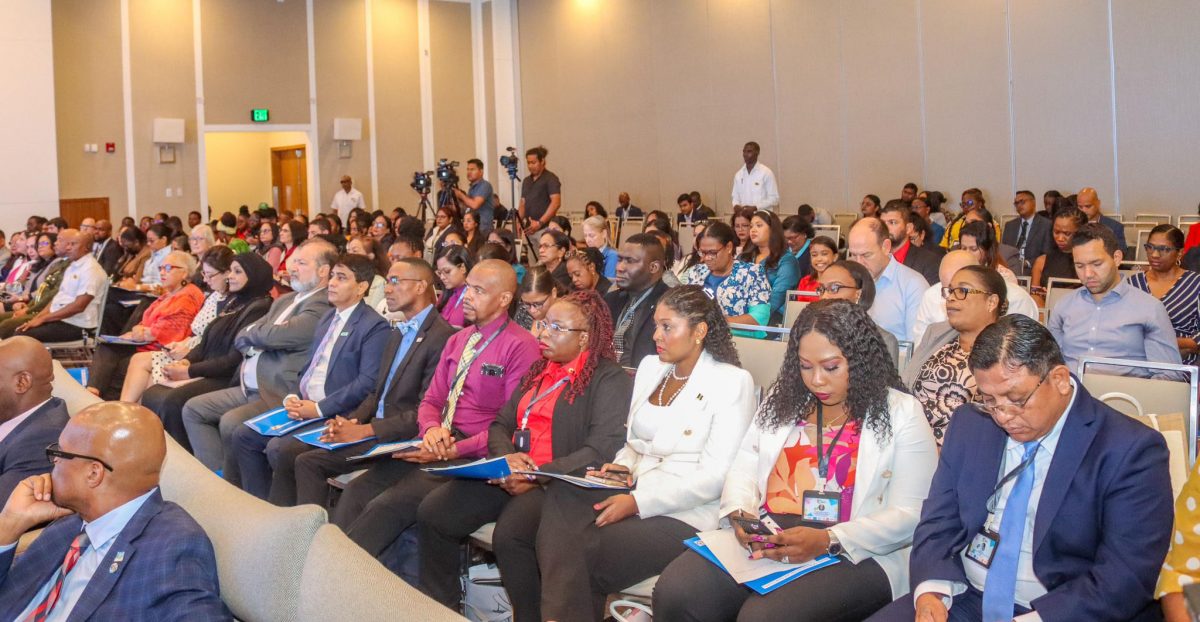As part of its efforts towards fostering gender equality and women’s empowerment in public policies and government budgets, the Ministry of Human Services and Social Security has joined forces with key ministries to examine the comprehensive integration of gender matters.
The aim of this collaborative approach is to ensure that gender perspectives are at the forefront of policy development, implementation, and evaluation, with an emphasis on addressing gender disparities and promoting gender equity.
As such, a landmark three-day conference which commenced yesterday, is being held at the Marriott Hotel ballroom in Kingston, Georgetown, under the theme, “Shared Experiences Towards Developing Robust National and Regional Models for the 2030 SDG Agenda”. There, government officials, regional delegates and advocates have come together to discuss and strategise ways and share experiences on advancing gender equality in line with the United Nations’ Sustainable Development Goals (SDGs).

The conference, the brainchild of the Ministry of Human Services, signifies a unified commitment by the government to strengthen the integration of gender perspectives within public policies and budgets. It underscores the importance of bridging the gender gap to achieve the 2030 SDG Agenda, which includes a specific goal (SDG 5) dedicated to gender equality.
The event welcomed a diverse range of participants, civil society representatives, key-stakeholders and experts in gender-related fields. Issues relating to gender equality and empowerment are expected to be addressed during the 3-day conference.
It began with addresses by President Irfaan Ali, Minister of Human Services Vindhya Persaud, Ambassador of the European Union, René Van Nes; United Nations Resident Coordinator, Yesim Oruç; Country Representative of the IDB, Lorena Solórzano Alazar; and CARICOM Secretary General, Carla Barnett. Their statements all underscored the urgency of addressing gender disparities and promote equality.
Minister Persaud highlighted the importance of integrating gender perspectives at all stages of public policy development, emphasising that this approach ensures that policies are truly inclusive and effective. She further noted that these goals have been viewed as unrealistic and impossible, but the Ministry is committed to achieving as much of them as possible.
“We can maybe even exceed the expectations with our collective discussions, shared experiences and the will and political commitment of those who are interested in ensuring that there is gender equality and what it means to the bigger picture of eradicating poverty and empowerment”, she said.
It was also noted that whilst empowerment is a word usually associated with women, males are also catered to in the call for gender equality to ensure that all persons have equal access to opportunities and the ability to self-develop as well as exploit their potential.
Two key focal points were highlighted under the heading of Gender-Based Violence, a phenomenon which is proven by statistics to affect women’s lives. Persaud informed that the EU/IDB Spotlight initiatives are being discussed both locally and regionally towards developing a holistic model that works for the region. Guyana will present its comprehensive model emanating from the collaboration to the CARICOM delegates.
The second focal point surrounds support for women in the workplace, while highlighting that even though women tend to outperform men in educational attainment, their labour force participation remains significantly lower than men. Therefore, further policies and initiatives are expected to be drafted to support women in the workplace.
President Ali in his feature address echoed these sentiments, while emphasising government’s commitment to SDG 5 – gender equality. He noted that fostering gender equality was not just a moral duty but also an economic imperative, as empowering women and marginalised groups can boost economic growth and social development
He referred to the high level of injustice which contributes to crises in other countries and signalled that it is critical for empowerment and equality to exist in Guyana. “Examine the budgetary framework of most countries in the region you would not see the budgetary framework matching the aspirations on gender equality and empowerment and that is a systemic. So how do we design our budgetary framework to show you how meaningful result by integrating gender equality and empowerment into the overarching budgetary?”, he asked.He posited that an important analysis must be conducted to deal with the issue of gender equality in the budget cycle through a budget framework and the ecosystem that surrounds the development of budgets in the region. The forum will further seek to discuss how the policy matrix and policy framework is designed to the achievement of this initiative.





